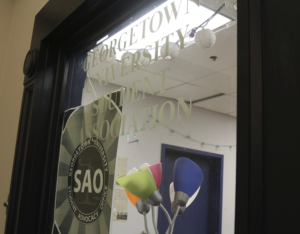A pilot program to subsidize off-campus mental health care has moved closer to implementation in the 2017-18 academic year after the Georgetown University Student Association presented Vice President for Student Affairs Todd Olson with a proposal Dec. 1.

The proposal comes after the GUSA mental health coalition launched a petition Nov. 17 that garnered more than 1,000 student signatures.
University President John J. DeGioia committed to investing resources into making health care more affordable in a Nov. 20 meeting, GUSA President Kamar Mack (COL ’19) said. DeGioia’s support for the program includes encouragement for the formulation of a broader strategy for increasing access to mental health services.
The GUSA plan, presented to Olson by Mack, would support 40 students’ off-campus therapy, providing up to $850 per student, or $34,000 to the program, annually.
The proposal also calls for Georgetown to allocate financial resources to fund off-campus mental health services for students who have demonstrated financial need. All students who receive financial aid and are enrolled in university student health insurance would be eligible to apply for the program.
Both DeGioia and Olson have expressed their commitment to improving mental health care access, Mack said. However, both hope the pilot program will exist as a part of a broader strategy to serve a wide range of students and their mental health care needs, according to Mack.
The proposal comes after the GUSA mental health policy coalition, led by Kenna Chick (SFS ’20), launched a petition for improved mental health support Nov. 17 that garnered more than 1,000 student signatures.
While GUSA has not yet released details on the selection process for recipients of the stipend, the program is designed especially for students who are not members of the Georgetown Scholarship Program but would benefit from its services, according to the proposal. GSP funding covers off-campus mental health care for students in the program, but students who fail to qualify for GSP struggle to afford the expensive market rate of mental health care in Washington, D.C., Mack said.
The average cost of therapy in D.C. ranges from $150 to $225 per hour. Under Georgetown’s student health insurance plan, the average deductible fee for medical services is $250 and the average copay is $25.
“If you’re not in GSP, all of those payments go through your GU student health insurance,” Mack said. “A big thing is the deductibles. A lot of times you have to pay $250 out of pocket just to have your insurance kick in.”
Under this program, eligible students would be referred to off-campus health care by Counseling and Psychiatric Services. They would then go to the financial aid office to discuss affordable ways to access their care. Student health insurance currently covers some, but not all, of these students’ mental health care expenses — the deductibles, for example, must be paid before insurance is used. This stipend aims to reduce health care costs for students who cannot afford off-campus health care with their student health insurance package, according to Mack.
Members of the GUSA coalition drafted the proposal after meeting with the Student Health Advisory Board, which consists of 10 student representatives, as well as Dr. Vince WinklerPrins, assistant vice president of student health, and Phil Meilman, CAPS director.
CAPS currently operates on a short-term model that provides service for up to two semesters. After these two semesters, students are referred to off-campus resources for long-term psychiatric care, according to Rachel Pugh, the university’s senior director for strategic communications.
“Long term care is typically referred to community resources. Where finances are not an issue, such referrals work well,” Pugh wrote in an email to The Hoya.
However, many students struggle with financial barriers to access to such long-term care, Mack said. Mack added that GUSA’s proposed stipend program is the best way to promote access to both short- and long-term mental health care.
“There are a number of students who, once referred off campus from CAPS, cannot afford the market rate for mental health care. They are being left in the dark, and the university needs to address that problem,” Mack said.
GUSA’s proposal is not seeking to replace CAPS services, according to Chick.
“It’s not an attack on CAPS. If anything, it’s a supplement to CAPS. CAPS is doing the best that they can,” Chick said.
CAPS’ short-term model provides immediate services for students if they are going through a traumatic situation or crisis, an important characteristic of a college counseling center, Chick said. If CAPS aimed to treat students on a long-term basis, the wait to see a counselor would be extremely long.
Pugh said the short-term model is common on most university campuses, as they seek to avoid long wait times.
“Counseling directors are reporting three-to-four week waits and in some cases even two-to-three month waits despite ramping up staffing and finding new and creative ways to deliver services,” Pugh wrote. “Here at Georgetown, CAPS operates on a short term model and can provide a semester or two’s worth of services, consistent with what is typically done at other university counseling centers.”
GUSA is also set to be employing its own fundraising efforts in early January to show a commitment to this issue and garner attention from the university, so the program can earn proper allocation of resources.
The proposed pilot program will take some time to implement, Mack said.
“A big question is how are we going to serve students’ needs sooner than a couple months from now?” Mack said.
Mack plans to provide immediate access to affordable care through philanthropy.
“In GUSA, we’re going to try our own internal funding routes and also continue to push on the university to do things in the short term,” Mack said.
Correction: An earlier version of this article stated that the university administration approved the plan. Administrators committed to allocating resources to make student health care more affordable, but did not approve any specific plan.














